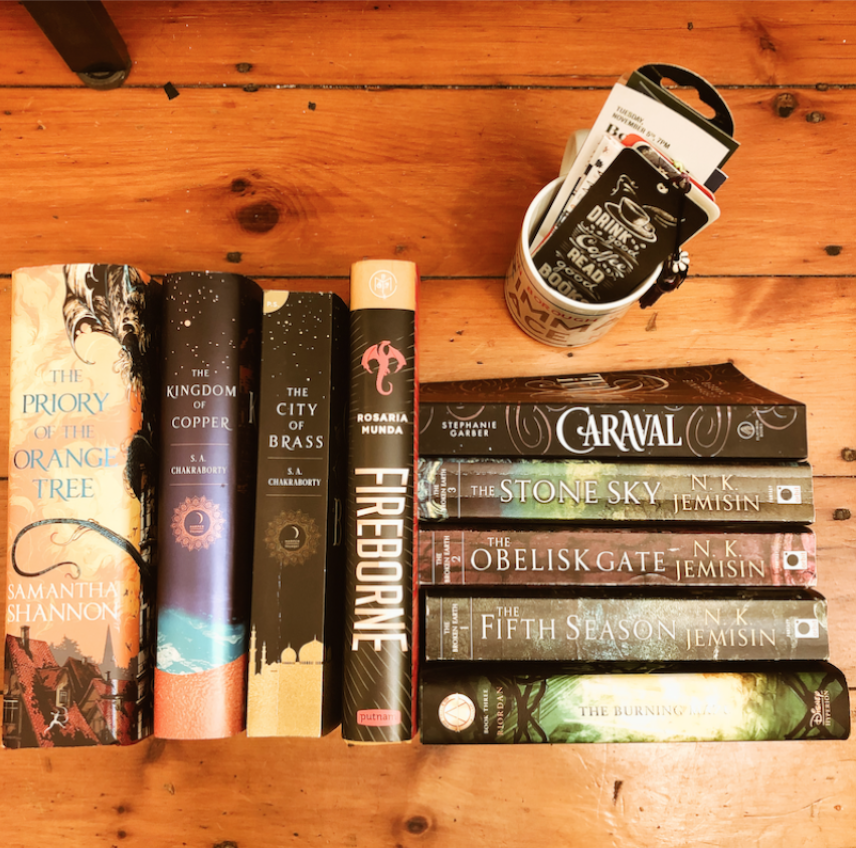
It’s fair to say that fantasy fiction is officially my current reading phase. Exploring the genre's intriguing variations has brought me joy in 2019. With the new year creeping ever closer (only 72 shopping days ’til Christmas!), reflection mode is kicking in, and I’ve begun identifying favorites and thinking about why they’re favorites.
Most readers have, at some point, read a book they expected to love and been unpleasantly surprised, which is to say that we can’t always know exactly why a book resonates. Still, we can identify patterns, features, tropes, and/or scenarios that call our name. Below are five of mine. I’d love to hear yours in the comments, or you can @ me here on Twitter.
Whimsical magic systems
Christelle Dabos’ The Mirror Visitor series translated by Hildegarde Serle
Stephanie Garber’s Caraval series (of which I’ve read the first book)
Erin Morgenstern’s The Night Circus
I love a magic system that makes me see the everyday in a new way. Objects have sentience. Illusions transform reality. Mirrors are conduits for travel. I especially love when these aforementioned qualities are realities of the novel’s world rather than being viewed, within that world, as special or otherwise setting those who have “magic” apart from those who do not. When magic can become a source of domination and control—whether by or against those who use it—it stops feeling whimsical, and the mood can veer into sinister (I'm thinking of V. E. Schwab's A Darker Shade of Magic).
Humans vs. Human nature and/or the natural world
N.K. Jemisin’s The Broken Earth trilogy
Samantha Shannon’s The Priory of the Orange Tree
One way of explaining this feature is by telling you what I don’t like: battles between good guys and the bad guys. For me, this often feels too neat. I find inspiration in books that help me understand human nature—what we can change about ourselves and what we can’t. In a related vein, I appreciate books that show humans persevering in the face of catastrophic natural events. We cannot change either our or the physical world’s natures, but we can learn to anticipate needs and prepare for effects productively.
Political/court intrigue
S. A. Chakraborty’s The Daevabad Trilogy (book three releases in 2020)
Rosaria Munda’s Fireborne (first book in The Aurelian Cycle released this year)
George R. R. Martin’s Game of Throne (book one of The Song of Ice and Fire series)
As with the previous category, political or court intrigue is most interesting to me when it avoids good vs. evil scenarios and acknowledges complex motives and loyalties. How do good ideas go wrong or good people go bad/bad people turn good? To what extent is it possible to mitigate the corrupting effects of power? By what means can individual and communal needs best be balanced? How do we break destructive cycles? Thinkers have been pondering these questions for thousands of years, yet we have no definitive answers; we probably never will. Fantasy worlds give us an opportunity to explore them beyond the boundaries of the everyday political or social alliances that can weight our thinking.
Rosaria Munda’s Fireborne (again)
Jenn Bennett’s The Lady Rogue
Rick Riordan’s Percy Jackson and friends series
Caroline Lawrence’s The Time-Travel Diaries (first book in a new series released this year)
Alix E. Harrow’s The Ten-Thousand Doors of January
A world order inspired by Plato’s Republic, an America in which Graeco-Roman gods and goddesses exist, a 1930s Romania in which Vlad Țepeș’s legacy exerts mystical potency—any fantasy novel with a historical scenario grabs my immediate attention. The past fascinates and captivates me, and studying it inspires me to appreciate both what has changed and what hasn’t and never will (i.e. human nature).
Now for an exception to my general rule: I have found that I do not enjoy novels set in mythical antiquity. Too often, these novels read the present into the past and find it unworthy rather than enable us to see that past on its own terms. The one exception to my exception is when modern time-travelers return to the past, as in Lawrence's wonderful middle grade Time Travel Diaries series. When the premise is a modern character visiting the past, then it’s less about narrative judgment and more about a single character’s struggle to acclimate and survive. Also, when it's middle grade, the focus is more on illuminating than judging the past.
Books built into the magic system
Anna James's Tilly and the Bookwanderers (first book in the Pages & Co. series)
Mechthild Gläser's The Forgotten Book
Genevieve Cogman's The Invisible Library series
Listen, sometimes reading fantasy is about escaping from the modern world and its stresses and pressures. When I feel anxious and mentally drained, getting lost in a world completely unlike my own can feel therapeutic. My tension eases. I sleep better. My mind feels more focused.
Some of my favorite escapist fantasy features books prominently, as part of the magic itself: characters jumping into or out of books, discovering that books have hidden powers (do they ever!), tracking down books for a mysterious hidden library. The meta aspect makes them comforting and relatable because the main characters and I share a core value about the importance of books.
If you read fantasy, what are your favorite fantasy scenarios? If you don’t read fantasy, what do you love to see in books of your preferred genre?